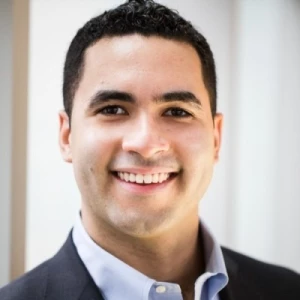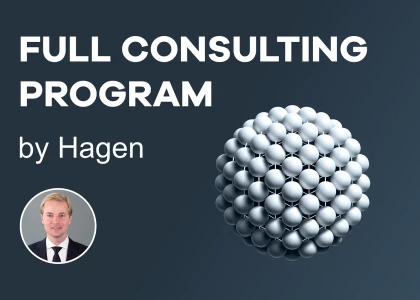I have an interview for an internship position with a Partner at Oliver Wyman who specialises in finance, consulting and leading financial institutions—a field in which I have no prior experience.
What cases do you suggest that I focus on practising?

What cases should I practice?


Hi Alexandrina,
First of all, congratulations on the invitation from Oliver Wyman!
I would be happy to share my thoughts on your question:
- First of all, while there is obviously a higher chance that your case studies will come from one of these industries, I would highly advise you to expect any case study.
- Moreover, I would highly advise you to consider working with an experienced coach like me to understand how to solve case studies, not which case studies to practice.
You can find more on this topic here: How to succeed in the final interview round.
If you would like a more detailed discussion on how to best prepare for your upcoming Oliver Wyman interviews, please don't hesitate to contact me directly.
Best,
Hagen

Hey there,
In my experience (from my Coachees) with Oliver Wyman Partners that specialize in finance and financial services, a lot of them tend to ask topical questions on investment decisions and market entry questions but that could apply to a broad array of industries. However, you can't benchmark on this and should prepare yourself for a whole array of potential questions. Oliver Wyman Partners make their own cases many times and give themselves a lot of flexibility to test your problem solving ability - so make sure to focus on your delivery and showcasing your skills too!
All the best

Hey there!
It is likely that the case he/she will select will be from his/her specific industry focus, but not necessarily. When I used to interview candidates, I had a small library of cases related to my focus industry as well as some cases related to the function I was mostly working in across industries (marketing & sales). That being said, I recommend you to
- Focus on FIG-specific cases across a wide range of functions. The partner may even have published articles that hint at which topics could be particularly relevant (e.g., digital transformation, operational excellence, etc.).
- Review a range of different cases from various industries and functions.
Hope it helps & all the best for your interview!
Maximiliane

Hey there,
Congrats on making it this far! :-)
Focus on learning how to case, not on specific industries!
The key reason why candidates fail their case interviews and don't improve with practice is because they never learn the right approach and techniques to begin with. They might go through 30-40 cases, just repeating the same mistakes over and over again. There is often no strong baseline.
Make sure you understand and learn the basics for each part of the case (structuring, charts, math), which is
A replicable step-by-step for each part of the case interview
The right thinking techniques around the individual parts (e.g., what's a framework, what is evaluated, how can I ensure I think about it the correct way, what are some shortcuts to get to the answer quickly, etc.)
Simple communication templates to help you communicate your insights as well as ask for data in the right way to drive the case forward
- There are several approaches you can take, such as hiring a skilled coach, reading the right materials, or enrolling in relevant courses. For example, my book, The 1%: Conquer Your Consulting Case Interview, provides direct guidance tailored to modern case interviews. It covers all the essential points mentioned here, and more, while also offering a detailed preparation plan. You can find it on Amazon
Avoid generic advice and framework memorization approaches. This will only hurt your performance and waste a ton of time (why -> check out the first post here: https://www.preplounge.com/en/consulting-forum/how-goodrelevant-is-the-case-in-point-book-for-case-prep-1984)
Once you have that baseline it's time to practice and internalize the skills to create the right profile, polishing your strengths and lifting your weaknesses to a robust-enough level
- Practice drills alone (structure, chart, math) and practice full cases with other excellent candidates that know the right habits and approach. It is crucial that you are practicing with really good peers, otherwise, it's a waste of time. Practicing drills on your own is a huge effectivity and efficiency booster since you can go over many more questions in a shorter amount of time compared to practicing with peers. Do both in parallel! You want to spend your time where it is most useful, e.g., if you struggle with math focus on math drills, etc.
Focus on quality over quantity. Doing 50+ cases does not mean much if you are not applying the right habits to score high and do a detailed debrief after every case to improve. You want to move from bad to good for your weaknesses and good to great for your strengths --> use the feedback from your previous experience and tailor your prep accordingly
Consider booking at least an initial coaching session to get a detailed and objective evaluation of your performance + learn the right habits for every case regardless of context and framework + get a tailored preparation plan out of the session that will set you up for an effective and efficient prep.
It does not hurt to focus a bit more on the relevant industries of your interviewer but chances are that not every case will be from that niche!
- Don't forget the fit interview part. Prepare answers for all the typical fit questions and stories (3-5 hours) and rehearse them a couple of times (5 hours)
All the best,
Florian

More likely than not, you'll have a case in the Financial Services industry, but you wouldn't be expected to be an expert in any given topic -- you just need to know how to problem-solve! It's not a bad idea to do some reading on industry and functional topics that this partner works in. For example:
- Strategic Planning: Advising financial institutions on corporate strategy, including market entry, expansion, and competitive positioning to drive growth and profitability
- Risk Management: Developing risk assessment and management frameworks to help banks and insurers identify, measure, and mitigate financial risks effectively
- Digital Transformation: Guiding banks and insurance companies through digital transformations, including the development of digital operating models and advanced data analytics capabilities to enhance customer experience and operational efficiency
- Operations Optimization: Helping financial institutions enhance operational efficiency by reengineering processes, streamlining workflows, and implementing best practices to reduce costs and improve service delivery
Reach out if you want to put your skills to the test during a coaching session!

Hi,
Thanks for your question.
You would have a high chance of getting a case in which the partner has current or past expertise.
That is because partners like to discuss situations which mimic current problems they are trying to solve in real-world or something that is top of their mind. When a partner interviews and recommends you for the position, they will only recommend you if they think you are capable of not only doing the role but also smart enough to succeed in the company in the long run.
Thus, in your specific situation, you have the highest chance of getting a case in financial services assuming the partner has been in that practice for a while. If he had prior expertise in another industry, you may get a case from a different industry which he is also knowledgable about.
Thus, I would suggest reviewing the partner's background through the company website or LinkedIn and see which are his expertise areas, but would emphasize preparing for financial services as first priority. Also see if he has any publications or books in a certain area.
Additionally, these are some general tips:
1. Start with reading a primer of the Fin svc/ fin tech industry if you have not done so already
2. Read about the latest problems facing the industry or the standard problems that have always existed in the industry - such as digital transformation, customer conversion and retention, operations related issues, M&A cases etc.
3. See if the partner focuses in certain function in the firm from their bio- strategy, M&A, operations, transformation etc. Try to do cases in these functions.
4. Spend the rest of your time brushing up cases you have done from other industries and functions. At least one type for each function since the skills are transferable across industries.
All the best and feel free to reach out if you have questions or would like to do a coaching session.
Thanks,
Soh

Honestly, you should still practice with a broad range of cases and industries. Of course, you have to know the financial services industry better, but that's not the only one you should be comfortable with.














